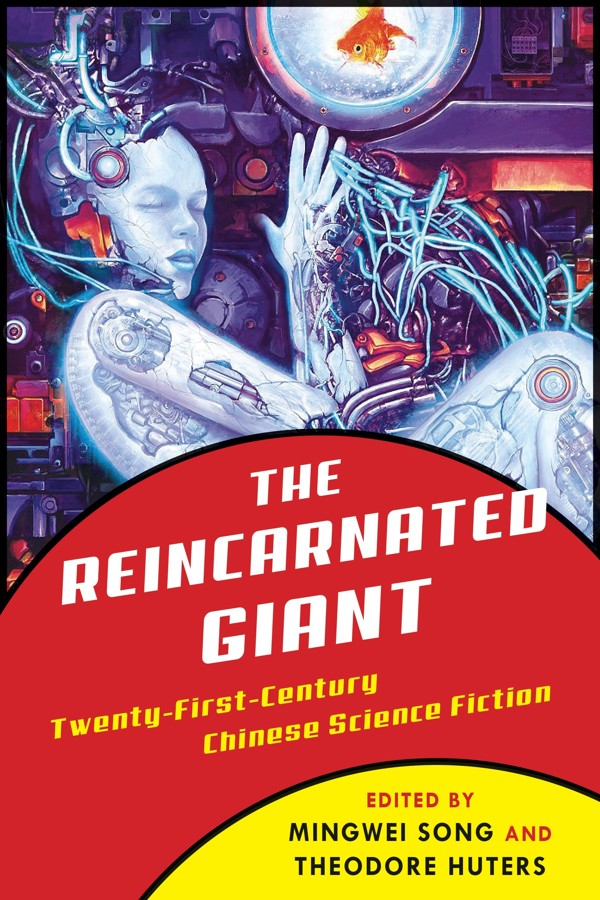
New Chinese science fiction anthology promises to reignite the genre
This collection of modern Chinese sci-fi writing covers everything from dystopia to cyberpunk and parallels with China’s economic growth, and according to some, heralds a new age of recognition for Chinese writers

The Reincarnated Giant: An Anthology of Twenty-First-Century Chinese Science Fiction
edited by Mingwei Song and Theodore Huters
Columbia University Press
3/5 stars
Until recently, in the words of author Fei Dao, Chinese science fiction was like a “hidden, lonely army … laid low in the wilderness where nobody really cared to look at it”.
But in the introduction to Chinese sci-fi anthology “The Reincarnated Giant”, modern Chinese literature expert Mingwei Song points out: “The situation has changed drastically in the past five or six years. Chinese science fiction has suddenly gained worldwide recognition, mainly because of the success of Liu Cixin’s novel The Three-Body Problem (translated into English by Ken Liu), which sparked a global sensation.”
Sci-fi maestro Liu Cixin questions morality of scientific advancements
A bestseller in the United States as well as China, The Three-Body Problem won the first Hugo Award for a novel originally penned in a language other than English and drove The Wall Street Journal to claim that a Chinese sci-fi invasion was underway.
“Today Chinese science fiction is no longer a hidden lonely army, and the genre’s journey to the West is no longer hesitant; it has become a fresh new force that is helping shape the outlook of global science fiction,” Song writes.

This new anthology, which Song compiled with Asian culture expert Theodore Huters, contains 15 short stories and excerpts from novels.
The blurb boldly positions the book as proof of a Chinese science fiction new wave, even a golden age that has reignited the genre.
It offers everything from cyberpunk to space opera and takedowns of the national development narrative.
The remit includes Taiwan, represented by the author of the post-human saga The Dream Devourer, Egoyan Zheng. Hong Kong makes the cut, too, represented by scholar Dung Kai-cheung, through an excerpt called The Lustre of Mute Porcelain, which comes from his epic two-volume work, Histories of Time.
The thrust of Lustre is an interview with a Hong Kong author called the Dictator by a young Eurasian known as Virginia. Less like science fiction than an exercise in dream logic, the text is marked by erotic overtones, metaphysical musings and lashings of perspiration.
Final frontier: Hong Kong sci-fi conference pushes boundaries
In one passage, the narrator records: “With her back to me, Virginia sat down on the piano bench, her snow-white bottom on the black leather bench creating an oval depression, just like how, in science books, the space-time continuum is deformed by gravity.
“She was in a state of focused attention, and I was afraid of disturbing her, so I stopped several steps behind her. Her back was covered in tiny droplets of sweat, like powdered silver, and when viewed from the side they gave off a dull sparkle.”
Elsewhere, in The Dream Devourer, Taiwan’s Zheng recounts a century long espionage war between humans and “biosynthetics”. And in The Radio Waves That Never Die, by playwright and media company chief executive La La, a post-human descendant receives the last message sent by the extinct human race.

In a spooky fable titled The Poetry Cloud by Liu Cixin, two poets and an ambassador embark on a trip to the South Pole. And in the title story, by engineer Wang Jinkang, a cancer-ridden tycoon named Imagai asserts his legal right to still be defined as his original self – even as bioengineers remodel his body and he inflates into a voracious monster.
According to Song, the giant tale reads as an allegory of vulgar Chinese tycoons’ disastrous craving for limitless development, wealth, power, even longevity.
“It foregrounds an unsatisfied desire for growth, a ubiquitous keyword in current news coverage of China’s economic leap, marked by a continuously escalating GDP. The outcome in Wang’s story comes as little surprise: the insatiable desire for development leads to uncontrollable results that eventually ruin the developers themselves. The grotesque image of the reincarnated giant epitomises China’s myth of economic development.”
How novelist Ken Liu is bringing Chinese sci-fi to the Western world
Song is an associate professor of Chinese at Wellesley College, Massachusetts in the northeastern United States and the author of the 2015 novel Young China. His co-editor Huters is professor emeritus in the Department of Asian Languages and Cultures at the University of California. Huters’ books include his editing and translating of the 2003 political tract China’s New Order by Hui Wang.
As Beijing pushes its “Chinese dream”, the two scholars’ anthology is touted as a look at the dark side – a nightmarish glimpse of the unconscious. In truth, the sprawling 424 page volume has such a boundary-busting, experimental vibe that it defies coherent interpretation.

The Lustre of Mute Porcelain is insanely complicated, like the chapter from Daughter by Taiwanese poet, novelist and essayist Lo Yi-chin, which Song describes as “labyrinthine”.
Themes of intergalactic war (The Village Schoolteacher) and airborne viruses (The Passengers and the Creator) also appear in the book, which will appeal to anyone with an appetite for innovative, dystopian visions.
But, for sure, some of the writing is bewitching, such as this description from The Passengers and the Creator by Xinhua journalist and key new wave figure Han Song.
“Sometimes, stars display themselves. Sometimes lightning flashes and thunder roars. Sometimes a golden orb emerges, and washed in its gentle glow, indistinct rows of serrated black cloud billow forth, like a chorus of demons performing on an empty stage.”
